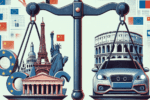Berlin, Germany – European authorities have issued a warning to Chinese automakers, notifying them to brace themselves for potential tariffs. This move comes amidst escalating tensions between the European Union and China, with electric vehicles at the center of the dispute.
In what could be the largest trade dispute between the EU and China, China-built electric vehicles have been subjected to duties. The imposition of tariffs on these vehicles marks a significant development in the ongoing trade conflict between the two global economic powerhouses.
The decision to levy tariffs on Chinese electric vehicles underscores Europe’s strategic approach to safeguarding its market and protecting domestic industries. The move aims to address concerns about unfair competition and market distortions caused by subsidies and other forms of state support provided to Chinese manufacturers.
While the imposition of tariffs may have immediate economic implications for Chinese automakers, it also raises questions about the future of trade relations between Europe and China. The move highlights the growing complexities of global trade dynamics and the challenges faced by policymakers in balancing economic interests with political considerations.
Chinese electric vehicle company Nio has acknowledged the potential impact of EU tariffs on its operations, hinting at the possibility of price increases in Europe. This development underscores the broader implications of trade tensions on businesses and consumers, emphasizing the need for strategic planning and risk management in an increasingly volatile global market.
As European authorities signal their intent to enforce tariffs on Chinese electric vehicles, the repercussions of this decision may reverberate across industries and economies. The move reflects a broader trend of protectionism and economic nationalism that has reshaped global trade dynamics in recent years, signaling a shift towards more assertive trade policies by major players in the international arena.
In conclusion, the decision to impose tariffs on Chinese electric vehicles by European authorities signals a deeper geopolitical and economic shift that could have far-reaching implications for global trade relations. As tensions between the EU and China escalate, the future of economic cooperation and trade dynamics remains uncertain, raising concerns about the implications of protectionist measures on global economic stability.










